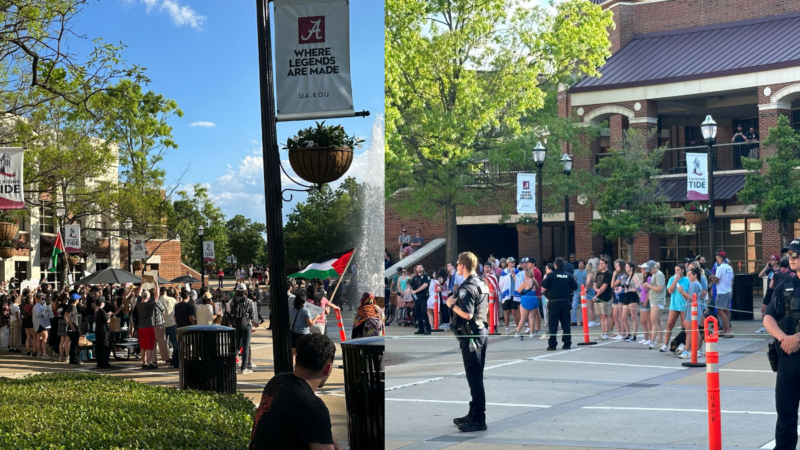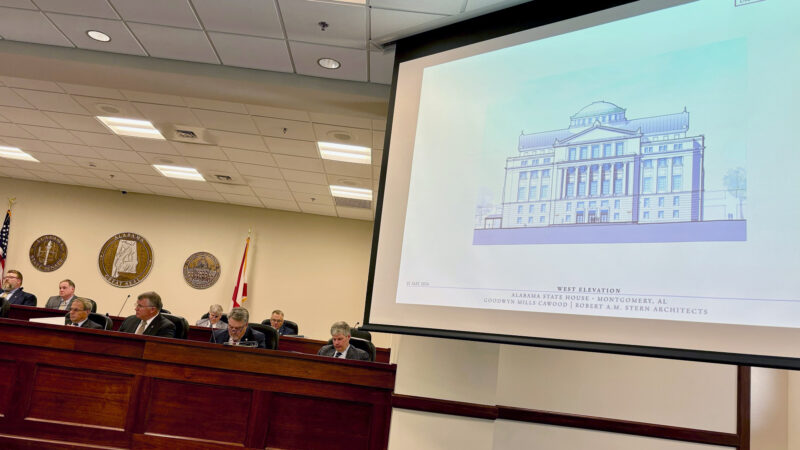Farm Guest Workers
Alabama farmers are wondering where they’ll find workers for next year’s growing season. They say the state’s tough immigration law has driven away much of the migrant labor they rely on. One option is for farmers to hire foreign guest workers. And as WBHM’s Andrew Yeager reports, a number of private companies stand to benefit.
John Aplin’s story has become a familiar one. He runs a fourth-generation family vegetable farm near Slocomb, Alabama. For years, he’s had reliable migrant workers each picking season.
“We’ve had our same crew up until this year for 23 years.”
Aplin says Alabama’s immigration law scared off his legal workers because they may have members of their families who are in the country illegally. He’s negotiating with the workers and trying to get them to come back. But Aplin’s concerned because timing is important for harvesting vegetables.
“So we have to have our labor force set well ahead of time and know that they’re gonna be here.”
Aplin says he’s never had luck hiring Alabamians even though he pays well over minimum wage. He calls the idea of using prison labor a joke. But he is thinking about hiring foreign workers under the federal government’s H-2A visa program.
The idea is fairly simple. Farmers who demonstrate they can’t get qualified American workers can use these visas to bring in temporary foreign workers. But application of the program is a lot more complicated.
“There’s a huge amount of paperwork and process.”
Jonathan Phillips is an agriculture economist at North Carolina State University. Beyond the red tape and fees, farmers have to pay to transport and house the guest workers. That has to meet standards.
“My house would probably fail an H-2A inspection right now, just because I have a busted screen and I have some dirty dishes sitting in my sink.”
Phillips says the program is so cumbersome, some agriculture operations will pay private companies to take care of the paperwork and find laborers. And one farmer says since Alabama’s immigration law went into effect, those companies have been circling the state like buzzards.
“Good morning, everybody. My name is Rodolfo Alvarez.”
Rodolfo Alvarez spoke at a farmers meeting at the Blount County Ag Center back in October. He’s CEO of the Phoenix-based Guest Worker Specialists.
“Currently I have in my database about 3,200 workers with passports ready and it’s just a matter of getting the sponsors to bring them across the border.”
And while using one of these guest worker companies may be more convenient for farmers, it’s not without cost.
“We’re going to charge them about $3,600 for everything that we do at the front end and that’s for whatever number of workers they’re bringing in.”
Kerry Scott is with masLabor H-2A, a Virginia-based company which places agriculture workers around the country. He says his company charges about $7,000 dollars for 10 workers. Some of that goes to government fees.
Scott says when Arizona, Alabama and other states starts passing immigration laws, the company feels it.
“Our phone very quickly starts to ring and requests for information via e-mail obviously ratchets up.”
 He says the law has brought some new business in Arizona and he expects to get a slice of the market in Alabama. But he says it’s not the bonanza you might expect.
He says the law has brought some new business in Arizona and he expects to get a slice of the market in Alabama. But he says it’s not the bonanza you might expect.
“We’re getting lots of inquiries, but they’re not resulting in somebody actually going into the program because the Obama administration is making it awfully difficult to use.”
Jonathan Phillips at North Carolina State agrees. Washington is making the program more expensive and bureaucratic. Phillips says the theory is that makes hiring American workers more attractive. So farmers are caught, he says, between an increasingly cumbersome H-2A visa program and increased immigration enforcement at the national level and in some states.
Alabama farmer John Aplin has been doing the math. The cost of finding workers, housing and transporting them. And by the way, you still have to pay the guest workers and as you can imagine there are regulations on wages.
“It’s a major headache. I mean, it’s a hassle.”
Aplin points out guest workers are exempt from payroll taxes, meaning a loss for federal coffers if he can’t find laborers in this country. Still Aplin says in his case, he could afford to hire guest workers, but he probably won’t. He likely couldn’t get them in place until too late in the season. He doesn’t really know where that leaves his farm.
Gambling bill in doubt with three days left in the legislative session
Alabama lawmakers are coming down to the finish line for this year’s legislative session. Many bills await passage, but perhaps the biggest one up in the air is a lottery and gambling bill.
Pro-Palestinian demonstration draws counter-protest at University of Alabama
Students gathered demanding the school call for a permanent and immediate ceasefire and to push the school to sever ties with defense contractor Lockheed Martin.
A new Statehouse and related projects will cost about $400 million
The Alabama Legislative Council, a 20-member panel comprised of legislative leaders and their appointees, approved the construction of the new Statehouse last year. The panel was given an update on the project on Wednesday.
New pilot program will offer housing, resources to people leaving prison
The Birmingham Reentry Alliance will provide wrap around services to dozens of men and women adjusting to life after prison.
Alabama committee advances ban on LGBTQ+ pride flags in classrooms
The Senate Education Policy Committee voted 5-2 for the House-passed bill, putting the proposal in line for a possible final passage in the last four days of the legislative session.
A New Orleans garden paid hundreds of dollars in fees for a sewer that doesn’t exist
Galvez Garden owner Lissie Stewart has been fighting the New Orleans Sewerage and Water Board over inaccurate billing for years.







